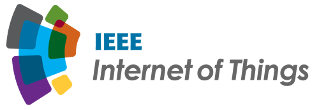TagItSmart – SmartTags for Unlocking Business Potential
Rob van Kranenburg
IoT (Internet of Things) is about connecting objects, things and devices and combining them with a set of novel services. The IoT market is unstoppably progressing, introducing a lot of changes across industries, both from the technological and business perspectives. The vision of the IoT did not change much from the beginning, but the reach that current technology brings to the table is still limited due to the certain limitations (i.e. technological limitation or for the practical reasons such as prices of the tags in some mass market scenarios) in different application of IoT.
Optimization of the whole value chain is providing many opportunities for improvements leveraging IoT technologies, in particular if information about the products is available and shareable. Many related industries are going to be affected by this, as packaging and insurance companies, among others, are requested to be more transparent to consumers, while consumers (78%) prefer brands that create unique and personalised content and are more interested in building a relationship with these companies [1].
Consumer packed goods (CPG) companies can prepare themselves for a range of possible futures by harnessing technology, reinventing brands, and exploring new business models [2]. The following five potential “undercurrents” that may impact the consumer product industry in 2020 are identified:
- unfulfilled economic recovery for core consumer segments;
- health, wellness and responsibility as the new basis of brand loyalty;
- pervasive digitalization of the path to purchase;
- proliferation of customization and personalization; and
- continued resource shortages and commodity price volatility.
An important aspect to take into account is the need for a service economy around IoT [3]. The interconnection of products will promote ecosystems of new online services; therefore, new business models based on this network capital are gaining momentum. The new value chains will increasingly organize itself as networks around consumers, offering a multiplicity of channels and interfaces across all value-add processes and business entities [4]. This makes consumer the one in charge, whose decisions affect the whole value-chain. Sharing information throughout the whole lifecycle of products and reactivity to context information are key in the short term.
The TagItSmart1 project sets out to address the trends highlighted above by redefining the way we think of everyday mass-market objects not normally considered as part of an IoT ecosystem. These new smarter objects will dynamically change their status in response to a variety of factors and will be seamlessly tracked during their lifecycle. This will change the way users-to-things interactions are viewed. Combining the power of functional inks with the pervasiveness of digital (e.g. QR-codes, quick response codes) and electronic (e.g. NFC tags, near field communication) markers, a huge number of objects will be equipped with cheap sensing capabilities (SmartTags) thus being able to capture new contextual information. Beside this, the ubiquitous presence of smartphones with their cameras and NFC readers will create the perfect bridge between everyday users and their objects.
TagItSmart has been developing a toolbox of functionalities (enablers) to manage the lifecycle of SmartTags; from their customized creation so they can react appropriately in response to exposure conditions of interest, to their scanning and decoding using even “off the shelf” smartphones, the processing and secure storage of carried information for on the fly recommendations as well as further data analysis. In addition, components and UIs that allow developers to introduce new services evolving around SmartTags that are then easily selected and executed by interested parties in an automated way and without requiring further technical knowledge from their side, are provided. This service platform is already being used to support diverse scenarios in the Smart Retail, Manufacturing, Brand Protection, Smart Health and Recycling domains, allowing condition tracking of mass-market products throughout their lifecycle, from the moment they are produced and tagged, during their useful life, up until they are eventually recycled/disposed of.
Conclusions
We believe that SmartTags, combined with this service platform, will create a completely new flow of crowdsourced information, which can pave the way for novel and previously infeasible services and business models, improved experience and revenue streams for stakeholders in the value chain; from manufacturers to logistics, retailers and all the way to consumers at home and recycling sites, empowering further the circular economy. The fact that we have already been approached by several companies interested in collaboration, the goal being using project outcomes to drive their digital transformation and creating novel services and benefits to their users, is live proof of the potential in the project and a guide of more things to come and stay in the long term.
References
[1] Consumer Goods Forum, ‘Rethinking the Value Chain: new realities in collaborative business’, 14 December 2015. [Online]. Available: https://www.uk.capgemini.com/resources/rethinking-the-value-chain-new-realities-in-collaborative-business.
[2] P. Conroy, K. Porter, R. Nanda, B. Renner, A. Narula, ‘Consumer product trends: Navigating 2020’, 25 June 2015. [Online]. Available: http://dupress.com/articles/consumer-product-trends-2020/.
[3] C. Links, ‘Consumers want Smart Systems Not Smart Things’, GreenPeak, 8 January 2016. [Online]. Available: http://www.sensorsmag.com/networking-communications/consumers-want-smart-systems-not-smart-things-20558.
[4] Consumer Goods Forum, ‘Rethinking the Value Chain: new realities in collaborative business’, 14 December 2015. [Online]. Available: https://www.uk.capgemini.com/resources/rethinking-the-value-chain-new-realities-in-collaborative-business.
 Stylianos Georgoulas is a Senior Research Fellow at University of Surrey, UK. He received a Diploma in Electrical and Computer Engineering from University of Patras, Greece in 2001 and his PhD degree from the University of Surrey in 2007. He has worked in a variety of EU and UK funded research projects such as the FP6 ENTHRONE, EPSRC MVCE Core 5 Flexible Networks, FP7 4WARD, FP7 UniverSelf and FP7 iCore projects. Currently he is the project manager of the H2020 iKaaS project and technical manager of the H2020 TagItSmart project. His research interests are in the area autonomic service management and energy-efficient traffic engineering, formal verification and stability control, applied in a range of environments ranging from fixed to wireless, cloud and IoT environments having authored and co-authored a number of papers in these areas.
Stylianos Georgoulas is a Senior Research Fellow at University of Surrey, UK. He received a Diploma in Electrical and Computer Engineering from University of Patras, Greece in 2001 and his PhD degree from the University of Surrey in 2007. He has worked in a variety of EU and UK funded research projects such as the FP6 ENTHRONE, EPSRC MVCE Core 5 Flexible Networks, FP7 4WARD, FP7 UniverSelf and FP7 iCore projects. Currently he is the project manager of the H2020 iKaaS project and technical manager of the H2020 TagItSmart project. His research interests are in the area autonomic service management and energy-efficient traffic engineering, formal verification and stability control, applied in a range of environments ranging from fixed to wireless, cloud and IoT environments having authored and co-authored a number of papers in these areas.
 Srđan Krčo is a co-founder and CEO of DunavNET, a company designing turnkey IOT solutions. He has over 20 years of experience, working with large multinational companies and driving international collaborative research and innovation projects. Currently, he is coordinating the research and innovation H2020 project TagItSmart, creating enablers for IoT of mass-market goods. Srdjan is a Board member of the International IoT Forum and is actively participating in IoT-EPI (IoT European Platforms Initiative) and AIOTI (Alliance for IoT Innovation) activities. In 2007, Srdjan won the Innovation Engineer of the Year award in Ireland. He has published over 15 patents and more than 70 papers at international conferences and journals and is a frequent speaker at international events addressing IoT and its applications. Srdjan is a Senior IEEE member. He received Microsoft’s MVP award for 2017/18 for the work done in the IoT domain.
Srđan Krčo is a co-founder and CEO of DunavNET, a company designing turnkey IOT solutions. He has over 20 years of experience, working with large multinational companies and driving international collaborative research and innovation projects. Currently, he is coordinating the research and innovation H2020 project TagItSmart, creating enablers for IoT of mass-market goods. Srdjan is a Board member of the International IoT Forum and is actively participating in IoT-EPI (IoT European Platforms Initiative) and AIOTI (Alliance for IoT Innovation) activities. In 2007, Srdjan won the Innovation Engineer of the Year award in Ireland. He has published over 15 patents and more than 70 papers at international conferences and journals and is a frequent speaker at international events addressing IoT and its applications. Srdjan is a Senior IEEE member. He received Microsoft’s MVP award for 2017/18 for the work done in the IoT domain.
 Rob van Kranenburg (1964) wrote The Internet of Things. A critique of ambient technology and the all-seeing network of RFID, Network Notebooks 02, Institute of Network Cultures. He is co-founder of bricolabs and the founder of Council. Together with Christian Nold he published Situated Technologies Pamphlets 8: The Internet of People for a Post-Oil World. He worked as Community Manager at the EU Project Sociotal, and currently as Ecosystem Manager of the Horizon 2020 Project TagItSmart. Rob is co-editor of Enabling Things to Talk Designing IoT solutions with the IoT Architectural Reference Model, Springer Open Access. Rob is in the SmartCitiesWorld Advisory Board. He chairs AC04 - IoT Hyper-connected Society of the IERC, The European Research Cluster on the Internet of Things. He is a member of The IoT Asia 2017 International Advisory Panel (IAP).
Rob van Kranenburg (1964) wrote The Internet of Things. A critique of ambient technology and the all-seeing network of RFID, Network Notebooks 02, Institute of Network Cultures. He is co-founder of bricolabs and the founder of Council. Together with Christian Nold he published Situated Technologies Pamphlets 8: The Internet of People for a Post-Oil World. He worked as Community Manager at the EU Project Sociotal, and currently as Ecosystem Manager of the Horizon 2020 Project TagItSmart. Rob is co-editor of Enabling Things to Talk Designing IoT solutions with the IoT Architectural Reference Model, Springer Open Access. Rob is in the SmartCitiesWorld Advisory Board. He chairs AC04 - IoT Hyper-connected Society of the IERC, The European Research Cluster on the Internet of Things. He is a member of The IoT Asia 2017 International Advisory Panel (IAP).
Sign Up for IoT Technical Community Updates
Calendar of Events
IEEE 8th World Forum on Internet of Things (WF-IoT) 2022
26 October-11 November 2022
Call for Papers
IEEE Internet of Things Journal
Special issue on Towards Intelligence for Space-Air-Ground Integrated Internet of Things
Submission Deadline: 1 November 2022
Special issue on Smart Blockchain for IoT Trust, Security and Privacy
Submission Deadline: 15 November 2022
Past Issues
September 2022
July 2022
March 2022
January 2022
November 2021
September 2021
July 2021
May 2021
March 2021
January 2021
November 2020
July 2020
May 2020
March 2020
January 2020
November 2019
September 2019
July 2019
May 2019
March 2019
January 2019
November 2018
September 2018
July 2018
May 2018
March 2018
January 2018
November 2017
September 2017
July 2017
May 2017
March 2017
January 2017
November 2016
September 2016
July 2016
May 2016
March 2016
January 2016
November 2015
September 2015
July 2015
May 2015
March 2015
January 2015
November 2014
September 2014


